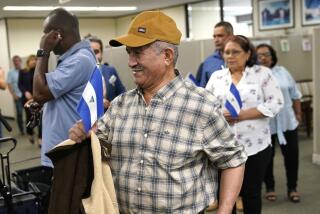Sandinistas Stall Talks, Nicaragua Indians Say
- Share via
SAN JOSE, Costa Rica — Leaders of Nicaragua’s Indian rebels charge that the Sandinista government is stalling on arranging talks to end the six-year-old civil war on their country’s Atlantic Coast.
The Indian leaders say they also have been under intense pressure from U.S. officials not to meet with the Sandinistas but insist that they still intend to participate in negotiations.
Miskito leader Brooklyn Rivera said in an interview last week that the government had agreed to allow a delegation of 10 Indians to enter Nicaragua for talks on Oct. 24, but at the last minute, Interior Minister Tomas Borge demanded that they accept an offer of amnesty. The Miskitos refused, contending they had committed no crimes and therefore needed no pardon.
Rivera said that Borge postponed the talks at least until next week, when a Central American peace plan is to go into effect.
Blames Managua for Shift
“There has been pressure from many parts, but the trip was not canceled because of us,” Rivera said. “The government changed its mind. They have demonstrated inconsistency and not very much sincerity on the dialogue.”
Rivera, who heads the new rebel group Yatama, said the government changed its mind on meeting with the Indians after leaders of the Nicaraguan Resistance--the umbrella group of anti-Sandinista guerrillas, known as Contras--announced that they intended to fly uninvited to Managua to seek a meeting with officials. Later, offered the same amnesty condition as were the Miskitos, the Contra leaders also refused the terms.
In a recent statement on Sandinista television, Borge confirmed that the government had reversed itself on the amnesty issue. The reason, he said, was that the Indians’ trip was being manipulated by the Contras.
U.S. Pressure Claimed
Rivera said U.S. officials made veiled threats to the rebel leaders, telling them that if they went into Nicaragua for peace talks, they “might have trouble getting back into other Central American countries.” He said it was suggested that Indian refugees living along the border in Honduras also might no longer be welcome.
A U.S. official in the region, who requested anonymity, denied that such pressure was applied to the Indians.
The U.S. State Department has been working since May to unite rival Indian rebel groups in a single organization that could forge an alliance with the Contras, but so far, the Indians have not joined.
More to Read
Sign up for Essential California
The most important California stories and recommendations in your inbox every morning.
You may occasionally receive promotional content from the Los Angeles Times.













